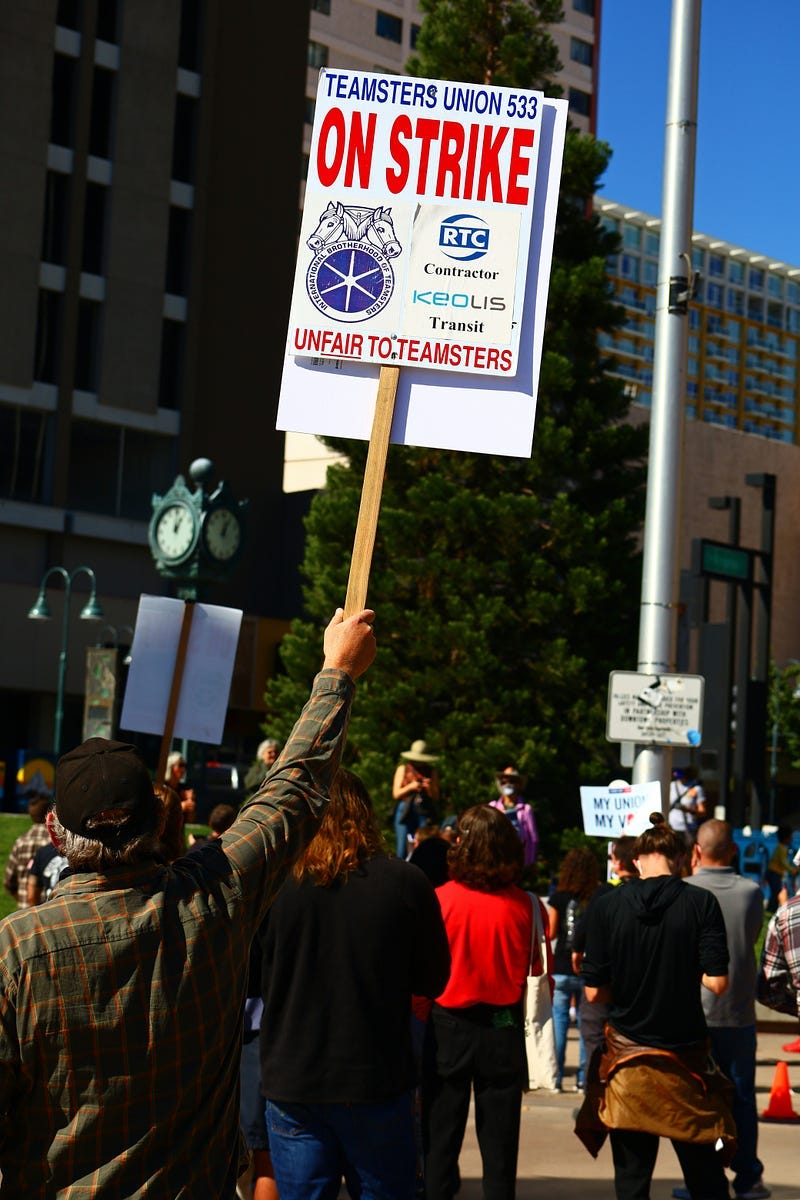American Federation of Teachers and United Auto Workers Team Up for 2028 General Strike
Perhaps there will be no major strike in 2028 if the winds continue blowing in our direction. If not, it's going to get very messy in America.

If you’re one of America’s approximately seven million public sector labor union members, the year 2028 is very important.
Not coincidentally, it will be another presidential election year.
Beyond that, though, it is also the year the United Auto Workers (UAW) president Shawn Fain has called on the US labor movement to join a nationwide strike to which the American Federation of Teachers (AFT) has just agreed at its annual convention to commit its 1.8 million members.
Extolling the AFT for its commitment to the union movement, Fain said:
We want to create a mass movement — a general strike if we have to — to win our fair share not just for workers here but for working-class people all over this globe. You guys passed a resolution to push unions to do just that… And that’s how we do this. When we fight and when we win, people want to be a part of that, they want to join the movement.
The date Fain has called for is May 1 — May Day, aka International Workers Day.
At the Houston convention this week, AFT passed the following resolution:
WHEREAS, the power that unions have derives from our unity:
RESOLVED, that the AFT will echo President Fain’s call for aligning contract expirations for May 1, 2028; and
RESOLVED, that the AFT will encourage all our locals to consider this common expiration as a useful tactic in the fight to advance racial, economic and social justice; and
RESOLVED, that the AFT will work tirelessly to repeal no-strike laws; and
RESOLVED, that the AFT will commit to unwaveringly supporting affiliates and the broader labor movement in bargaining fair contracts, and in anticipated or active labor disputes.
UAW members won record contracts with “the Big Three” automakers earlier this year and enjoy the distinction of having the first sitting President of the United States, Joe Biden, the most pro-union president since Franklin Roosevelt, join them on a picket line.
Unions made America.
They created the American middle class.
This year we celebrate a unionization renaissance as more companies have won the right to collectively bargain and lawmakers have thrown their support behind them.
Two years ago, Sen. Elizabeth Warren re-introduced a bill from 2017 and 2020, the “Nationwide Right to Unionize Act,” that would repeal Section 14(b) of the National Labor Relations Act, and make illegal right-to-work-for-less laws that prohibit unions from collecting dues from non-union members covered under union contracts.
Last year, the National Labor Relations Board (NLRB) won a decisive victory when it ruled it will make unionization efforts easier at companies that violate law resisting organizing efforts.
One crucial piece of federal legislation, the “Protecting the Right to Organize” (PRO) Act, seeks to grow and strengthen union membership by:
Introducing meaningful, enforceable penalties for companies and executives that violate workers’ rights;
Expanding workers’ collective bargaining rights and closing loopholes that corporations use to exploit workers;
Strengthening workers’ access to fair union elections and requiring corporations to respect the results.
Last January, the Bureau of Labor Statistics reported union membership in the United States in 2021 to be at 10.3 percent. To put that into perspective, in 1983, the first year for which comparable union data are available, the unionization rate was 20.1 percent with 17.7 million union workers.
One of the intentional casualties of 40 years of neo-liberal Reaganomics is the precipitous drop in public-sector unions.
Fortunately, we currently (for the next six months anyway) have a president who is the first in the past four decades to refute neo-liberal economic policies.
Should Vice President Kamala Harris win in November, this union renaissance will no doubt continue. She addressed the AFT Thursday, laying out a vision in which she intends to continue and expand the Biden administration’s progress. This includes providing approximately $1.2 billion in additional student loan relief for 35,000 borrowers and public service employees, decreasing housing costs, capping rent increases at five percent, expunging medical debt from credit reports, prohibiting most “surprise billing” medical charges from out-of-network insurance providers, allowing Medicare to negotiate for more affordable pharmaceutical drugs, capping insulin and asthma inhalers at $35 a month, and passing more substantive gun safety legislation instead of suggesting teachers be armed.
The timing is not accidental. Calling for a national strike in four years was supposed to coincide with an open seat for the presidency; instead, we are looking at a possible re-election of Kamala Harris (or, forlornly, an end of another Trump term after which the labor landscape would look bleak).
The presumptive Democratic nominee for president addressing the final day of a convention of one of the most powerful unions in America sends a crucial message that collective bargaining is a force to be reckoned with. Harris likely wouldn’t have done it if there was little or no political momentum from which to benefit.
With the wind at our backs, we must keep up the pressure lest risk losing gains we’ve made.
FULL SPEECH: Vice President Kamala Harris in Houston speaks at AFT Convention
Vice President Kamala Harris, who has jumped into the spotlight following President Joe Biden dropping out of the…www.youtube.com
America has arrived at a crossroads, and the direction we take could plunge us deeper into neo-liberalism’s feudal tax cuts for the economic royalists, or again into an age where the wealthy pay their share of taxes and average workers producing the largess off which the wealthy profit will benefit from higher wages, better living standards, and democratic workplaces.
Perhaps there will be no major strike in 2028 if the winds continue blowing in our direction.
If not, it’s going to get very messy in America.



